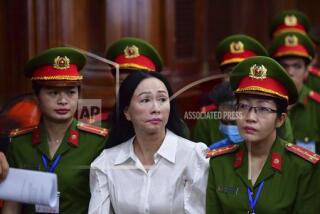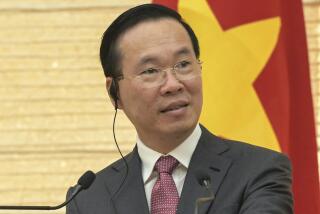Viet Premier Pham Hung; Strategist for Hanoi in War
BANGKOK, Thailand — Vietnamese Premier Pham Hung, the last of the old guard revolutionaries in the top rank of the Communist government, died Thursday of a heart attack, the official Vietnam News Agency announced Friday.
Hung, 75, an architect of North Vietnamese operations against the U.S.-backed government of South Vietnam during the war, was stricken in Ho Chi Minh City, formerly Saigon, where he began his revolutionary career in the 1940s.
From 1967 until the war’s end in 1975, Hung was director of the Communist Party’s Central Office for South Vietnam, an elusive target of American ground and air operations during the fighting.
He was Vietnam’s interior minister, in charge of the country’s police and security, when he was elevated to prime minister last June, replacing the aged and ailing Pham Van Dong in a leadership shake-up aimed at energizing the administration and the economy.
Economic Reform
The news agency said Hung would be temporarily replaced by Vo Van Kiet, an exponent of economic reform who will serve as acting prime minister until the National Assembly chooses a replacement for Hung.
The death of the longtime conservative party leader is not expected to cause any significant change in Vietnam’s domestic or foreign policy, now under the direction of Nguyen Van Linh, 72, the party general secretary.
The Vietnam News Agency report, monitored in Bangkok, said, “Faced with many major and complicated duties and working under stress to resolve urgent problems concerning the livelihood of the people nationwide, the comrade had a sudden massive heart attack.”
Radio Vietnam proclaimed three days of mourning beginning Sunday, to conclude with a state funeral in Hanoi.
Top Planner
Hung was born in southern Vietnam, in Vinh Long province. Much of his party career was spent in the south, under French colonial administration and Japanese occupation in World War II. He was a top planner against the Americans and their allied South Vietnamese government, and was instrumental in planning the north’s 1968 Tet offensive, which is considered by many historians to be the turning point against U.S. support in the war.
Hung’s appointment last summer as prime minister was seen by some analysts as a sop to the conservative wing of the party, but there has been no sign that he stalled the tentative reform efforts of Linh. He was the third prime minister of the Hanoi-based government, following Ho Chi Minh, the father of the Vietnamese party and revolution, and Dong, Ho’s successor.
More to Read
Sign up for Essential California
The most important California stories and recommendations in your inbox every morning.
You may occasionally receive promotional content from the Los Angeles Times.










